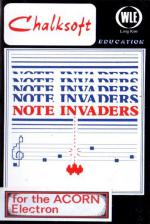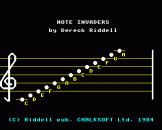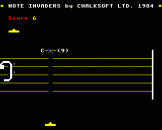Introduction
Note Invaders is a set of three programs designed by a respected, practising Teacher of Music to help anyone learn the musical notes on the staff. Both STAFF and TREBLE clefs are covered.
The Invaders game is great fun and rapidly helps speed reading - so essential for sight reading music.
STAFF1 and STAFF2 provide a teaching set and test on the notes.
| Invaders | is an essential way to really learn the notes on the musical staff (the five lines on which music is written). A note travels across the staff and you must press the correct key for that note (A to G) to release your rocket before the note wipes you out! A great game - you have four lives, and can choose TREBLE or BASS clefs, and three levels of difficulty. High scores are shown. | ||
| STAFF1 | demonstrates the notes on the TREBLE and BASS clefs, and puts questions to you as you learn - ideal for anyone wanting to read music (perhaps to play an instrument). | ||
| STAFF2 | provides a 'test' of twenty questions, and has notes shown on the screen with correct sound. If you make a mistake, you are reminded of the note names. |
||
For Teachers
STAFF1 and STAFF2 have options for teachers so that individuals or classes can use the programs in turn. If desired, scores may be kept in memory until the teacher calls them up - full details of this and all the options are on the screen at the start of the programs!
A package of three music programs designed to introduce music notation. The programs exploit modern techniques made possible by the computer, and are readily used in school, at home, and by specialist music teachers.
More children than ever before are taking up a musical instrument. One of the major obstacles which clouds their initial enthusiasm is having to learn to read music. These programs help by teaching the initial steps in a really enjoyable way.
Note Invaders - one of our highly acclaimed MUSIC EDUCATION series.
STAFF1
This program introduces the student to the notes of the Treble Clef - from Middle C to the A above the stave. It is intended for use by children or adults with little or no musical knowledge, effectively combining traditional teaching with computer concepts in order to produce a new and exciting approach to this age old problem.
The program uses a linear design - that is, working through the lesson in logical steps. There are several stages in the program where the computer checks that the pupil has understood the lesson. As well as note names and their position on the stave, elementary use of ledger lines is introduced. At the end, the user may choose to see the program again, or go on to Staff 2.
STAFF2
This is a test which offers the option of Treble or Bass clef. There are twenty questions in each set. The computer selects a note at random, and prints it and plays it. Then the student has a set time in which to press the key giving the note name. The teacher (or the student) selects the length of time allowed, at the program start.
Suitable sound effects herald right and wrong answers. If you are wrong, the screen shows the correct answer, and then takes you to a short revision section before you continue with the test.
For Teachers
Music teachers will find the program very flexible to use. When asked if being used by a teacher, answer "Y". Now, the teacher may select use with an individual student, repeating the test if necessary, or with a succession of pupils as a more formal test. In the latter case, at the end of each test, the computer will ask for the next pupil and wait for a new name.
If the teacher types "SCORES" as the name, the computer will print (on screen) the names of all the pupils who have taken the test, together with their scores, ready for the teacher's mark book. Further tests may then be taken, up to 10, before the score sheet needs to be cleared. (10 tests are more than enough for a single school lesson.)
The options of speed and treble or bass clef are "locked in" once chosen by the teacher, at the start of the program. Note that the "difficult" level is intended for experienced pupils only.
For Students
If the program is not being used with a teacher, answer "N" to the start question (Is this being used by a teacher?). You can now select the level of difficulty (speed), with either BASS or TREBLE clef notes. It's a good idea to take the test regularly (say 3 times a week) and keep a checklist of your scores.
BASS Clef
If you select the Bass Clef option, a simple but effective aid to remembering the notes is presented, as part of the test. Once the treble clef notes are mastered, the bass notes will not prove too difficult!
Note Invaders
This is an "arcade" type game, designed to test the student's note reading skills whilst increasing his/her speed. The program has proved very popular with students of all ages, most of whom are convinced they are playing a game when in fact they are engaged upon an important learning experience!
The game offers a choice of TREBLE or BASS clefs and three levels of difficulty. Scoring is directly related to the level of difficulty so for really high scores, you should select "Difficult".
For Teachers
Teachers may choose treble or bass clefs, and the choice is then "locked in".
The Game
A reminder is first given of the notes on the staff chosen (treble or bass) and full on-screen instructions are available if required.
The staff, clef sign and end bar line appear on screen. A note (chosen at random) then travels across the stave from left to right. It is "shot down" by pressing the correct letter on the keyboard.
If you are wrong, of if the note hits the end bar line, a bomb is dropped and one of your bases is destroyed. You have four bases, and when all are destroyed the game ends.
At first the notes travel quite slowly, but speed is increased as the game progresses. After about two minutes of playing, the end bar starts to move inwards, giving even less time for responses.
Scoring
Your score depends on how far across the note travels before you identify it - the fursther it goes, the lower the score. So, it is best to respond quickly. If used by a group, there will be great rivalry to achieve the highest score (which is displayed on screen) and this also results in improved note reading.
Typing
The notes are typed from the keyboard. This may seem a little difficult for "novice" typists, but all eight letters (A to G) are quite close together on the left side of the keyboard, and users soon begin to find them quickly. Similar manual dexterity is needed to play most instruments!
Using The Programs In School
With a whole class
If possible, use a large screen monitor (550mm / 22" or more). In this case, the sound produced by your micro may need boosting by an external amplifier. As an example, this is easily achieved on the BBC Micro by connecting an inexpensive SOUND LEVEL CONTROL - available from Chalksoft Accessories - and then connecting this directly to an audio amplifier and speakers.
Teaching Method
Go through STAFF1 with the whole class, verbally expanding on the program as you go. This will ensure all the class remain attentive. If necessary, run STAFF1 through a second time. Then go on to the next section - STAFF2. Select the easiest level and allow the pupils to volunteer the answers, either at random, or by turns. Next divide the class into two groups, to take questions in turn. STAFF2 allows plenty of time to answer (at the easiest level) and is therefore especially useful with inexperienced groups. Note Invaders is great fun to use with large groups. Each turn is quite short, so that a good number of pupils are able to use the computer within a lesson.
With small groups and individuals pupils
The ideal position for the computer and monitor/TV is in a small room adjacent to the main classroom. Pupils take turns to use the programs, either in small groups (up to 4) or individually. The teacher can keep a record of scores from STAFF2 tests, by reading from the screen list. Over the weeks, progress will be seen, and pupils who need extra help - and computer time - identified. The competitive aspect is best utilised by the Invaders game. Pupils readily compete, and their totals might be combined to give class scores.
Teacher's Friend
The programs can truly be said to provide music teachers with an extra pair of hands. The computer will patiently test and exercise students, giving very necessary repetitive practice in the essential skills of fast sight reading of notes, releasing the teacher, and his piano, for other aspects of the curriculum.
Using The Programs At Home
At home, it is useful for a parent or friend to talk through STAFF1 with the user, to ensure the points are grasped. On STAFF2, you should keep a record of test scores, and try to take the test regularly until consistently high scores are schieved. The Note Invaders game is also best used regularly. (It's addictive so that won't be a problem!) As well as speeding up your note reading (and helping you to be more accurate), Invaders is a useful program to come back to. Everyone gets a little "rusty", especially after holidays etc., away from musical staves and instruments. A few games of Note Invaders will help here.
BASS And TREBLE Clefs
Beginners will normally tackle the Treble Clef notes first, and graduate to the Bass Clef once the Treble is well known. STAFF2 contains extra help for Bass Clef students. Of course, you may be learning an instrument where Bass notes are needed from the start. Your music teacher will be able to advise you on the best approach!
Enjoy the program, and your music making!







